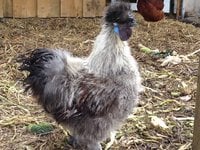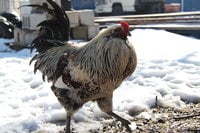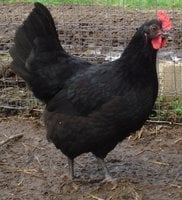TEMPERAMENT: The most docile breed overall. Even the roosters are very kind and patient with hens, children, and other pets. Temperament-wise, you couldn't ask for a better bird.
They also are extremely broody. Not only do they make great incubators, but great mothers as well. they will sometimes even adopt chicks from another chicken's nest that have already hatched. They have been known to try and hatch golf balls, giant fowl eggs, and even feces.
HEALTH & PROPER CARE: - Silkies have many health problems. vaulted skull, cross-beak, in some cases crest inhibits proper vision. Their fluffy feathers cannot protect them against cold if the feathers get wet. Silkies require access to a shelter at all times. They are most fragile when they're very young.
EGG PRODUCTION: Lays smaller type eggs. when they're not broody, they typically lay with great consistency. however, since they tend to go broody quite often, don't expect your hens to lay many eggs/ year in comparison to other breeds. this breed is best used for natural incubators and mothering young, rather than high egg production.
HISTORY: with those fluffy feathers, what's not to love? one might think the silkie was created simply for enjoyment alongside it's docile nature. however, this breed was actually NOT created to be a pet. Originally, they were bred for meat. Breeders wished to create a bald chicken, therefor removing the feather-plucking step in processing the meat. one of their first steps towards a bald bird was the Silkie. This beautiful accident, however, quickly caught on and thus overtime, the silkie was bred for ornamental use more than consumption. Over time, selective breeding decreased the silkie's overall stature,& is technically considered a bantam.
They also are extremely broody. Not only do they make great incubators, but great mothers as well. they will sometimes even adopt chicks from another chicken's nest that have already hatched. They have been known to try and hatch golf balls, giant fowl eggs, and even feces.
HEALTH & PROPER CARE: - Silkies have many health problems. vaulted skull, cross-beak, in some cases crest inhibits proper vision. Their fluffy feathers cannot protect them against cold if the feathers get wet. Silkies require access to a shelter at all times. They are most fragile when they're very young.
EGG PRODUCTION: Lays smaller type eggs. when they're not broody, they typically lay with great consistency. however, since they tend to go broody quite often, don't expect your hens to lay many eggs/ year in comparison to other breeds. this breed is best used for natural incubators and mothering young, rather than high egg production.
HISTORY: with those fluffy feathers, what's not to love? one might think the silkie was created simply for enjoyment alongside it's docile nature. however, this breed was actually NOT created to be a pet. Originally, they were bred for meat. Breeders wished to create a bald chicken, therefor removing the feather-plucking step in processing the meat. one of their first steps towards a bald bird was the Silkie. This beautiful accident, however, quickly caught on and thus overtime, the silkie was bred for ornamental use more than consumption. Over time, selective breeding decreased the silkie's overall stature,& is technically considered a bantam.



